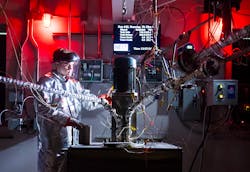Fed Nuclear Regulators mulling Abilene Christian University request to build 1-MW Molten Salt Test Reactor
A private Texas university is asking for permission from the U.S. Nuclear Regulatory Commission to build a molten salt research reactor on the campus.
Abilene Christian University filed a construction permit application with the NRC. It wants to build a 1-MW, non-power reactor studying molten salts both as fuel and to cool the reactor.
“The facility would provide a platform to research molten-salt technology, as well as educational opportunities in nuclear science and engineering,” reads the NRC release about the filing this month.
If the NRC issues the construction permit and the facility is built, ACU will have to submit a separate application for an operating license in the future.
Abilene Christian attached a 611-page safety analysis report with its construction permit application. In the building application, the school says the molten salt reactor would offer training opportunities for faculty, staff and students in advanced nuclear technologies, and the license would involve approval to receive, possess and use special nuclear material, according to the NRC filing.
In the preliminary safety analysis, the school notes it is making a huge investment in advanced research and developing a pipeline to a nuclear-qualified workforce. Currently, conventional large-scale nuclear power accounts for 20 percent of the U.S. electricity resource mix and more than half of its carbon-free power generation, according to federal statistics.
The ACU safety report to the NRC describes the molten salt reactor as having a graphite-moderate core, loop-type and thermal spectrum reactor with a fluoride-based fuel salt flowing through stainless steel fuel circuit components. It is designed to be equipped with an off-gas system that can relocate fission gases for sequestration and decay.
“The low-power MSRR is designed to be passively safe,” the NRC filing reads.
More Nuclear sector news from EnergyTech
Idaho National Lab: Small Reactor Nuclear offers Fuel-secure, Carbon-free power for Microgrids
NRC gives final certification approval for NuScale Power SMR
One Small Step: NASA, DOE award $5M contracts for developing Nuclear Fission power plant on the Moon
Subscribe to EnergyTech's free Email Newsletter for more stories on the C&I Path to NetZero
The U.S. Department of Energy has awarded grants to the university’s Nuclear Energy eXpermimental Testing Lab, or NEXT lab. The research there is on exploring advanced nuclear as carbon-free power generation with molten salts, instead of water, used in the cooling process.
Nuclear energy offers power on demand and the reduction of greenhouse gas emissions, the ACU NEXT lab page reads. The lab is headed by Rusty Towell, an Abilence Christian undergraduate alum who is professor in engineering at ACU and holds his doctoral degree in physics from the University of Texas at Austin.
Two years ago, a Nuclear Energy eXperimental Testing Research Alliance was formed including Abilene Christian, Georgia Tech, Texas A&M and the University of Texas at Austin.
Abilene Christian University was established in 1906 and currently has an enrollment slightly over 5,000 students both in undergraduate and graduate studies.
The Idaho National Lab and other entities have proposed the concept of smaller, safety-passive nuclear reactors to provide carbon-free power for microgrids, data centers and other purposes.
The NRC recently gave its design approval to a small modular reactor design by Oregon nuclear firm NuScale Power.
-- -- --
(Rod Walton, senior editor for EnergyTech, is a 14-year veteran of covering the energy industry both as a newspaper and trade journalist. He can be reached at [email protected]).
Follow us on Twitter @EnergyTechNews_ and @rodwaltonelp and look us up on LinkedIn
About the Author
Rod Walton, EnergyTech Managing Editor
Managing Editor
For EnergyTech editorial inquiries, please contact Managing Editor Rod Walton at [email protected].
Rod Walton has spent 17 years covering the energy industry as a newspaper and trade journalist. He formerly was energy writer and business editor at the Tulsa World. Later, he spent six years covering the electricity power sector for Pennwell and Clarion Events. He joined Endeavor and EnergyTech in November 2021.
Walton earned his Bachelors degree in journalism from the University of Oklahoma. His career stops include the Moore American, Bartlesville Examiner-Enterprise, Wagoner Tribune and Tulsa World.
EnergyTech is focused on the mission critical and large-scale energy users and their sustainability and resiliency goals. These include the commercial and industrial sectors, as well as the military, universities, data centers and microgrids. The C&I sectors together account for close to 30 percent of greenhouse gas emissions in the U.S.
He was named Managing Editor for Microgrid Knowledge and EnergyTech starting July 1, 2023
Many large-scale energy users such as Fortune 500 companies, and mission-critical users such as military bases, universities, healthcare facilities, public safety and data centers, shifting their energy priorities to reach net-zero carbon goals within the coming decades. These include plans for renewable energy power purchase agreements, but also on-site resiliency projects such as microgrids, combined heat and power, rooftop solar, energy storage, digitalization and building efficiency upgrades.

